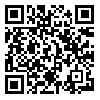BibTeX | RIS | EndNote | Medlars | ProCite | Reference Manager | RefWorks
Send citation to:
URL: http://irancounseling.ir/journal/article-1-150-en.html
Babollah Bakhshipour Aim: The purpose of conducting this research was to study the relationship between humor styles and marital conflicts among married college students. Method: Descriptive and correlational research methodology was used. The statistical population comprised of all the married college students at Payam Noor University in Sari, Iran. Total of 314 married (183 female and 131 male) college students were selected in accordance with Krejcie & Morgan (1970) table, by multistage sampling. Participants completed the humor styles (Martin et al., 2003) and Marital Conflict Questionnaires (Sanaee, 1379). Results: Findings showed a negative significant correlation between adaptive humor styles (affiliative humor style r=-0.214 and self-enhancing humor style r=-0.116) and marital conflict. Also, no significant relationship was seen between maladaptive humor styles (aggressive humor style r=0/052 and self-defeating humor style r= 0/088) and marital conflict. Significance level is set at P<0/01 and P<0/05, while T-test showed significant difference between the two genders (P<0/000) when looking at maladaptive humor style (aggressive and self-defeating). Conclusion: There seems to be a negative correlation between adaptive humor styles and marital conflict and some marital conflict’s factors, and that there seemed to be no significant correlation between maladaptive humor styles and marital conflict and its factors. In addition, there was seen a significant difference between men and women in using different humor styles.
Received: 2015/12/18 | Accepted: 2015/12/22 | Published: 2015/12/26
| Rights and permissions | |
 |
This work is licensed under a Creative Commons Attribution-NonCommercial 4.0 International License. |


